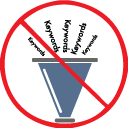You probably learned from your marketing team that the inbound marketing strategy, specifically the keyword aspects you may be using, will probably not work as well in 2013. How quickly things change! 
With the recent changes Google introduced into its ranking algorithm via the Penguin and Panda updates, SEO strategies that relied on an overabundance of keywords stuffed into your website will be penalized for spamming. This is what’s called “keyword stuffing,” and is no longer a valuable tactic, in fact, it’s harmful!
However, when it comes to keywords and your marketing strategy, there is still a need to capitalize on keywords. You will need an organic approach that enhances your conversion rate as well as your SEO.
Your marketing team should be using a keyword strategy that includes these elements:
- Link the appropriate landing page—Keywords should be inserted as close to the topical content as possible. You may want to front load your website with an array of keywords, but most users will scan a page for desired content and leave if it is lacking. This contributes to loss of conversions and Google penalizes you for limited user time on page and engagement. It is more important to keep the specific page with relevant content linked to your search listing.
- Use more specific keywords on later pages—The home page of your site should utilize general keywords which will attract visitors who only possess an introductory understanding of your products or industry. Once you provide more information they can explore pages with detailed information on more developed pages. Again, keywords that are more specific to a unique product should be relegated to those specific pages.
- Choose less competitive keywords—While it is attractive to choose keywords that possess the highest traffic, that keyword strategy may not be as effective for your company. After all, your competitors are probably choosing those keywords as well. It may be more productive and cost effective to identify keywords that allow you to dominate the rankings page. An effective keyword strategy is to focus on long tail keywords, which are more specific to your business. (A keyword with a long tail?! A keyword phrase consisting of a few more specific and descriptive words. For example, instead of “leads” a long tail keyword phrase may be: “generate more leads.”)
- Listen to social media conversations—Identifying which keywords are most important to your consumers may come from a variety of methods, but paying close attention to social media engagement may be one of the most important ways to assist your inbound marketing plan. Listening to conversations within essential market segments may alert you to the keywords that are most relevant.
- Test your keywords—Keywords ebb and fall in popularity, so any keyword strategy should also be dynamic. Using tools like SEOMoz Pro can detail if the keywords your marketing team has chosen are likely to remain popular or diminish in importance in the near future.
Needless to say, whatever keywords you choose, utilize them sparingly and in a way that is logical and relevant. To sum: write good content that is optimized for keywords but ultimately still proves informative and useful to the end user.
Work closely with your team to monitor how successful your keyword strategy is; if one phrase isn’t leading to conversions, you may need to choose others that are more popular.
An effective keyword strategy is just one aspect of inbound marketing that can help you capitalize on driving more traffic to your website and ultimately generating more leads. If you are looking for other inbound marketing tactics to help you generate more leads, click the link below to download our lead generation eBook.




